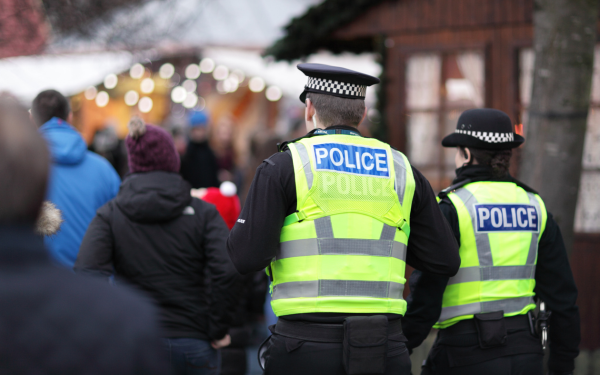
Do you agree with the police not attending most mental health incidents?
- In principle, but health and social care need to be resourced to deal with the added workload (46%, 815 Votes)
- No, it puts health and social care practitioners at increased risk. (41%, 720 Votes)
- Yes, it's not their role. (13%, 225 Votes)
Total Voters: 1,760
Approved mental health professionals (AMHPs) have voiced concerns about the impact on their safety of a national police policy of not attending most mental health incidents.
In some areas, AMHPs are attending mental health callouts in pairs because of a lack of police involvement, in the light of the introduction of the right care, right person (RCRP) policy, but this is not always possible due to staffing constraints.
More broadly, health and social care services are struggling to manage the increased demands placed on them from RCRP, introduced last year under an agreement signed by the government and health and policing leaders.
Those were among the findings of an evaluation of RCRP published by the Home Office and Department of Health and Social Care (DHSC) this week.
The study was based on an analysis of the policy’s impact in a sample of police areas, alongside surveys of NHS integrated care boards (ICB) and local authorities and research with health and social care staff, carried out by the University of York and the King’s Fund.
What is Right Care, Right Person?
Under RCRP, which was trialled in Humberside from 2021 onwards, police should only attend mental health-related incidents:
- to investigate a crime that has occurred or is occurring; or
- to protect people when there is a real and immediate risk to life or of serious harm.
The rollout of the policy was based on analysis that found 45% of police attendances at mental health-related incidents involved no immediate threat of serious injury, nor any crime.
RCRP is designed to be implemented by local partnerships of the police, NHS and local authorities, in four phases:
- Health services no longer calling the police to make welfare checks related to a person’s mental health, for example, when a person does not attend an appointment and they have significant concerns about them. Such checks should be carried out by mental health staff instead.
- Officers not being called when a person leaves a healthcare facility without completing treatment or someone sectioned under the Mental Health Act 1983 (MHA) goes absent without leave, unless they are deemed to be an immediate threat to themselves or others.
- The police not being asked to convey patients to health facilities, with ambulances doing this instead. This includes people detained under section 136 of the MHA, which empowers the police to take someone to (or keep them at) a place of safety if the person appears to have a mental disorder and needs immediate “care or control”.
- Timely handovers of people detained under section 136 from the police to healthcare staff.
However, some areas have implemented the phases in different orders or all at once.
Health and social care struggling to meet additional demand
A Home Office analysis of the impact of RCRP on five police forces from 2022-24 found monthly savings in officer time of between 1,030 hours in the Northamptonshire force to 18,910 hours in the Metropolitan Police, due to reduced attendance at mental health incidents.
However, health and social care services were struggling to deal with the resulting increase in demand, found a DHSC survey of 34 of the 42 NHS integrated care boards (ICBs) and 35 of the 153 councils in England.
Sixty two per cent of ICBs and 40% of councils said they had faced barriers to implementation. For NHS respondents, the most significant barrier by far was cost and funding pressures, which was cited by 21 of the 34 ICBs. Meanwhile, for councils, the most significant obstacle was a lack of infrastructure to implement RCRP, which was cited by 10 of the 35 authorities.
The Home Office and DHSC found that health and social care services were struggling to take on tasks previously carried out by the police, in the context of rising demand for mental healthcare. Referrals for adults increased by 3.3% a year, and those for children by 11.7% a year, from 2016-24, according to the recent Darzi review of the NHS in England.
Demand set to rise
No additional funding was provided to the NHS or councils to implement RCRP, which the DHSC/Home Office report said “will make it difficult for health and social care services to meet the demand that was being dealt with by the police, prior to RCRP”.
Looking to the future, most ICBs and councils expected to see greater demand on their services as a result of RCRP.
Eighty seven per cent of councils expected to see moderately or significantly increased demand for AMHP services, with 74% saying the same of other adult social care services and 80% of community mental health teams (CMHTs).
Most ICBs (85%) also expected to see increased demand for CMHTs, with all of them anticipating growth in the requirements on mental health crisis teams.
Lack of workforce capacity and capability
Similar themes were reported in the King’s Fund and University of York report, which was based on interviews with 29 staff from across mental health, social care, ambulance, acute trust and voluntary sector services.
Participants said a lack of staff was a particular constraint on being able to respond to mental health incidents, including because of high vacancy levels.
Having staff with the right capabilities was also an issue for some services. This was particularly true of ambulance services, who were being increasingly called upon to deal with welfare issues, despite lacking the police’s legal powers to gain entry to premises or detain people should this prove necessary.
Ambulance staff raised concerns about police not staying with patients when they transported them to a place of safety, since they did not have training in restraint or appropriate safety protection.
Reduced use of police powers to detain
Use of the police’s power to remove a person to, or keep them at, a place of safety under section 136 of the MHA fell by 10% in 2023-24, which police chiefs linked to the implementation of RCRP.
AMHPs interviewed by the King’s Fund and University of York said the implementation of RCRP was reducing police attendance for the purpose of using section 136 powers in their areas.
In some cases, AMHPs had resorted to making increased use of section 135 of the MHA in order to guarantee police attendance. This empowers a magistrate to issue a warrant, on the application of an AMHP, enabling a police officer to remove a person with a mental disorder from a private place to a place of safety for assessment.
Some interviewees said it was easier to organise a section 135 than risking a need for a section 136, because the requirement to attend at a defined time gave services an opportunity to plan and ensured the attendance of all required professionals.
AMHP safety concerns
However, AMHPs also voiced concerns for their safety when undertaking Mental Health Act assessments in the community without police involvement.
In some areas, AMHPs were attending callouts in pairs, but this was not always possible due to capacity constraints.
Areas were also struggling to reduce handover times from the police to healthcare staff when a person had been removed to a place of safety under section 136.
According to the DHSC and Home Office report, ICBs said this was down to factors including a lack of health-based places of safety to remove people to and insufficient trained staff to manage people in a crisis.
A ‘police-led initiative’
The King’s Fund and University of York researchers said they heard “several examples of good practice, with strong multi-sector partnership working and communication, enhanced by open and, if necessary, robust feedback”.
Practitioners also welcomed the intent of RCRP to enable a more health and social care-focused response to mental health issues, said their report.
However, it added: “Our interviewees generally felt that there has been insufficient focus on the impact of RCRP on health and social care service users, staff and systems, with a perception that it is a police-led initiative, and reports of its impact focusing on efficiency gains for the police.”






 Bournemouth, Christchurch and Poole
Bournemouth, Christchurch and Poole  Hampshire County Council
Hampshire County Council  Oxfordshire County Council
Oxfordshire County Council  South Gloucestershire Council
South Gloucestershire Council  Wokingham Borough Council
Wokingham Borough Council  Webinar: building a practice framework with the influence of practitioner voice
Webinar: building a practice framework with the influence of practitioner voice  ‘They don’t have to retell their story’: building long-lasting relationships with children and young people
‘They don’t have to retell their story’: building long-lasting relationships with children and young people  Podcast: returning to social work after becoming a first-time parent
Podcast: returning to social work after becoming a first-time parent  How managers are inspiring social workers to progress in their careers
How managers are inspiring social workers to progress in their careers  Workforce Insights – showcasing a selection of the sector’s top recruiters
Workforce Insights – showcasing a selection of the sector’s top recruiters 

 Facebook
Facebook X
X LinkedIn
LinkedIn Instagram
Instagram
Vindication for those of us who never bought into the use of police as a default standby. Bit late now to complain that police aren’t any longer responding because we don’t really know who we are assessing. Taking police for granted that they will plug the gaps in our services and be an alternative safe space was always going to bite us eventually. Had this discussion practically every opportunity I git in the past 4 years with our AMPH lead but as ever went nowhere. So now we’re are somewhere called now.
I know most social workers think all AMHPs ever do is practice ever more ingenious ways to avoid accepting referrals let alone actually organise and conduct MHA assessments but to accuse them of seeing the police as the service that should do the work they themselves should be doing is stretching it a bit. That said “there’s no police availability” is a stock phrase so perhaps there’s something in this after all. And yes I am an AMHP but perhaps not a very on message one.
Using the Police to the degree that has become common place has helped hide the degree of under resourcing of social care. It is right that the Police step back from a responsibility which is beyond their remit. It is not helpful that the situation developed in the first place, or that it is being reversed at such a pace, but it should be reversed. The impact on services and individuals could be catastrophic.
Police should be involved in Mental health assessment where necessary they have more safety equipment and clothing. Ie body armour where doctors and amp.have a pen and a piece of paper. Police are crucial in some cases in the presentation of harm to the individual concerned and the other people involved, including family members. I speak from a 40 year career in social care.
Well maybe AMHPs should have spoken up years ago about abuse of police services by NHS MH services.
No one seemingly gave enough of a damn about how abusive of vulnerable ppl this has been. The trauma left real scars. The risks escalated.
Very angry and too often very violent police attendances means those who need earlier intervention arent now coming forward.
Neither are families. Because guess who is left with this mess? Family dont get to clock off go home get rest.
Try being in the Met area .
The most violent mysogenist racist force in the country.
And they were relied on to keep vulnerable ppl safe.
AMHPs were complicit.
Now they rightfully feel at risk.
What did they think their collective silence would result in?
I was attacked whilst lone working completing a MHA assessment a couple of years ago in the early hours out whilst out working alone in the community. This attack ended my social work career. My union rep advised I should take my case to court over lack of duty of care for out of hours worker. The unions solicitors refused to take my case. They stated that the LA could not for see that I would be attacked. I had to agree an agreement of joint resignation and take my private pension. My concern was aimed at the lone working policy out of hours and how this places AMHP’s at unacceptable risk in my humble opinion.
Two things. This review has completely left out the shocking number of deaths that have occurred since RCRP came in. I don’t have the data because I think that the authorities don’t want to publish them, as it is dynamite for the public to find out. Their trust in the police has reached rock bottom through decades of institutional racism, and sexually assualtative murderers like Wayne Couzens.
Within weeks of RCRP coming in one area, a man rang the poice desperate for help as he knew he could act dangerously due to a mental health crisis. The police quoted RCRP, refused to respond, and an hour later, the man had killed himself and three members of his family. This has not been an isolated incident.
Secondly, after 14 years of disastrous austerity cuts, including over £40 billion from local authorities, and over 3,000 inpatient beds cut, there is no money in the NHS or LAs to fund practical support for AMHPs or other MH service staff to do their riskiest work such as MHA assessments. The police knew this but withdrew anyway. The disgusting Tory government watched and didn’t care what happened. Now they’ve been voted out and will never face the consequences 😒 🙄
Hang on, don’t have the data but know there have been a “shocking number of deaths”. How? What’s the correlation between one incident and RCRP coming in within weeks? Had he also contacted mental health services? If so what was their response to him? We as AMHPs, as mental health workers, as social workers need to own our responsibility in our over reliance on use of police as a default. There we are telling the public that people with mental illness are no more violent then them but in our own sphere of work seek police assistance as routine. Why? Austerity, poor service design, rock bottom staff morale, lack of beds and the rest all contribute to the neglect of mentally ill people, their families and their friends as does our blase attitude towards neighbours and communities coping with the consequences. We too are culpable for why the police have decided to narrow their reasons for responding. Start with that. If we are serious about sorting out the mess that is.
The polarity of social work convictions exemplified by Neil Sanyal and Tahin. If only we had competent and interested leaders who could help us navigate to common ground.
RCRP has had the effect of police only attending community MHAAs with a S135.1 warrant in place! I’m sure if you investigate the amount of S.135 warrants that have been applied for since RCRP was inaugurated, you’ll find a reduction in police presence in A&E Depts with a resultant escalation in Warrant applications by AMHPS. RCRP has been a disaster in terms of police support for community MHAAs. Also, due to the lack of planning by health services, police have been forced to just drop vulnerable adults in A&E without using S136 powers as they just can’t afford to be detained for hours in A&E Depts. No contingency plans in terms of security provision in A&E Depts by Health Managers!